Karamakhi: and brother went to his brother
This complexity was its main difference from most articles and reports of those weeks. Most journalists certainly took the "federal" side. However, the circumstances of the place and time gave grounds for that - in Dagestan in August-September 1999 of the year, the Russian military, for the first time, probably after 1945, feeling like defenders of their people, behaved accordingly ... however, with some exceptions. It is in this "exception" was Karamahinsky enclave, otherwise called Kadar zone: here the "siloviki" behaved like a foreign land. At that time, little was written about this reverse side of the war: the Russian media definitely preferred only “one side of the coin”, for the present, sincerely and voluntarily.
But the reason for writing the article the reader to the publication of the other series, among who were in the minority - in view of the latter circumstance in these texts more likely to be accepted as truth. In the 37 edition of the Novaya Gazeta for 1999, the story of an officer who participated in the “sweeping” of Karamakhi village was recorded by Alexander Gorshkov. In this story, it was just about the “horrors of war”, but, first, the villagers appeared as a single mass opposing the federal forces, and, secondly, the cruelty of the latter eclipsed the “sweeps” of the first Chechen war. In Karamakhi we saw something else - but this is in the article ...
We wrote this response article, sent it to the editor, but it was not published - now it doesn’t matter why. Began landslide events: the Caucasus - in October the federal forces entered Chechnya - and in Russia as a whole - the political process, for which the war was the main PR tool. What happened in Dagestan was rapidly receding into the past.
But now, the publication of this article seems to be quite appropriate. And because the events of August-September of 1999 in the village of Karamakhi are part of our common “lasting past”, which we have not yet understood. And because, despite all the changes, the style of the Russian government in many ways remained the same: at first not to notice the problem, then not to notice its complexity, but in the end to use force. All this, of course, is spectacular - at first there are no difficulties at first, then they exist, but they are simple, and finally, they are solved in the same simple way. A curtain. Awareness of problems, discussion, decision-making - all this is absent. Today - because the public space is almost collapsed. Then, at the end of 1990-x - because the Russian society itself, voluntarily turned away from difficult issues.
A. Ch.
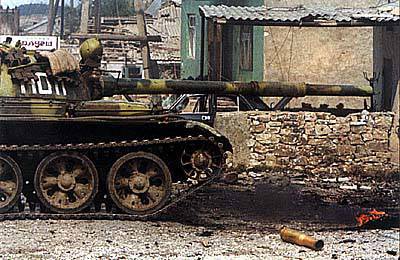
A man approached a group of men in civilian clothes sitting in the square near the dilapidated building of the former police station and began to talk excitedly about something. Gloomy people got up, took the guns and quickly went from the square up the street. There, on the forested slopes of the mountains surrounding the village, some of those who are called Wahhabis are still hiding; one just seen near the caves. Now the militia went to capture or kill their fellow villager. Soon the gunfire came from above.
We saw this scene on September 20 [1999] in the village of Karamakhi. The first time one of us [A. Cherkasov] visited there was still a “sweep”, the second time we arrived in the village, when part of it was already “cleaned” and controlled by local militias.
At the entrance to the village on the side of the highway there was a long convoy of trucks, trailers, cars. Very dissatisfied men walked along it in groups of people - these were residents of Karamakhi and Chabanmakhi who left their villages, waiting for permission to return to their destroyed houses. Then - a police post, serpentine, winding road to the gorge, a few burnt armored personnel carriers on the sidelines, and, finally, a view of the village Karamakhi. Here, at the entrance, is a detachment of the Dagestan militia. The military are gradually withdrawing from the Kadar zone, transferring control over the villages to the Dagestan Interior Ministry. Here, too, locals are scurrying around - those who, by hook or by crook, managed to overcome cordons on the roads and get into the village. When they learned that one of us [S. Kovalev] was a State Duma deputy, they immediately began to complain - they say, now that the battles have ended, and most of the residents haven’t been allowed back, the houses and even ruins are being plundered. Militiamen, both visitors and their own Dagestans, pull everything that has survived from their houses.
There were almost no policemen in Karamakhi - fearing the snipers on the slopes of the surrounding mountains, they try not to walk around the village streets. The militia detachments from the surrounding Avar villages (mainly Dargins live in the Kadar zone) were not allowed in Karamakhi or in Chabanmakhi. To maintain order in Karamakhi, part of the local residents who fled at the beginning of the fighting were allowed back to whom the Ministry of Internal Affairs distributed carbines. However, many of the militias were armed with machine guns; we didn’t ask where they got them from. The reaction of these militias to the news of their fellow villagers, Wahhabis, discovered somewhere nearby, we described at the very beginning of the article.
*****
Karamakhi village was terribly destroyed - there are almost no intact houses, most of the buildings were turned into ruins. But even now it was clear that it was a strong, prosperous and working village. It is widely spread in a small mountain valley. Solid large houses surrounded by large estates. The source of wealth is also visible - in the village and around it all the land that is amenable to cultivation is occupied mainly by vegetable gardens. The villagers themselves brought cabbage, potatoes and other vegetables to sell not only in Dagestan, but also far beyond its borders. For this, many families had their own cargo trailer, which, moreover, made it possible to have an additional income from long-distance transport.
The streets of the village are asphalted, gas and water are held. Most of the houses were heated in winter with gas central heating. Now the gas pipes are torn and twisted by a blast wave, riddled with shards.
"Where does such wealth come from? None other than from the Wahhabis!" - this is exactly what has been stated in many newspaper and magazine articles. It was they, the Wahhabis (depending on the sympathies of the author, whether seeking to bribe the villagers insidiously, or, on the contrary, taking care of their well-being) gave money to buy trailers, gasified and asphalted. Such statements caused extreme bewilderment of the residents of Karamakhi and Chabanmakhi, with whom we spoke. Trucks, including trailers, they acquired before the appearance of Wahhabis in their villages, and with them - but with their own hard and long hard-earned money.
As for the improvement of the village, it is more difficult. As far as we can judge, the appearance in the village of a religious fundamentalist community aspiring to power had only an indirect relation to this. Asphalting of streets, gasification, improvement of water supply, the Karamakhins are associated with the name of the head of the administration of the villages of Karamakhi and Chabanmakhi Akhmed Ataev. In any case, it was under him that a significant part of this work was carried out. It is obvious that he was a protege of the Makhachkala authorities and tried to resist those whom (correctly or not - we will not go into the discussion about this) are called Wahhabis. Based on the classical conflictological scheme, in such cases, in order to reduce the base of support for opposition groups, the authorities are recommended to pay attention to the social sphere - which was done. Karamakhi administrations allocated money for improvement, but it did not help. 21 June 1996 of the year Atayev, who was driving in a car, was killed in an ambush. Find the killers failed. Several members of the Wahhabi community were arrested, who were then acquitted by the Supreme Court of Dagestan for lack of evidence.
Now the former prosperity is in the past. It is clear that the recovery of the village will take many years, and the winter [1999-2000's] is about to begin. It is for this that the Karamakhins and the shepherds with whom we spoke, presented a tough account to their fellow Wahhabis: “We told them to at least moderate their intransigence towards the authorities. Warned that for the village it will not end well. So no, they did not want to listen to us, started an armed confrontation. At any cost, they wanted to establish their “right authority”. And now I have not sat down. Because of them."
*****
There are other claims - first of all, imposing on the majority, one’s own ideas about how one should live - often with the use of force.
“Why, if I want to celebrate the wedding, I can not do it the way it was always with us? Why did they forbid us to celebrate holidays, for example, the New Year, the first of May, the eighth of March? ”
Wahhabism - the current in Islam, which seeks to purify it from centuries-old stratifications and deformations, does not recognize the separation of secular and spiritual power. In those areas of Dagestan, where Wahhabism had been developing for many years (for example, in Tsumadinsky), peaceful coexistence of the traditional and Wahhabi communities, their dialogue and even reconciliation were still possible. But in Karamakhi, the Wahhabis came from the outside and more recently, as a closed and aggressive sect. At first they gradually, and then - more and more resolutely began to take power in the village into their own hands, in the end - they drove out the police, and began to arrange a righteous life according to their own understanding. Only an active minority of Karamakhins resisted innovations. Most of the villagers, who were accustomed to submit to any fads of the Soviet power, at first perceived the “reforms” as insignificant, but eventually woke up unexpectedly in the conditions of Sharia rule, where almost all the customs they observed (and not only May 1 and March 8) turned out to be outlaw.
A separate topic is the activity of the Sharia court. This court, which consisted of the inhabitants of Karamakhi and Chabanmakhi, put into practice the widespread use of corporal punishment in relation to his fellow villagers. The usual sentence is 40 punches. The list of offenses for which such a punishment could follow was quite large. Most often - drunkenness or violation of public order. But there could be another “crime”. For example, in June of this year, a resident of Karamakhi was punished with dicks, who dared to participate in an event against Wahhabism organized by the administration of Makhachkala. However, the court punished for serious crimes. During the reign of the Wahhabis in Karamakhi, there was one murder, and a member of the Wahhabi community committed it. In a domestic altercation, he shot his neighbor’s machine gun. Sharia court sentenced the killer to pay a fine and exile from the village. They say that the convict went to Chechnya. In the opinion of all our interlocutors, the court was biased, as a result of which it passed a too lenient sentence.
"Why do Karamakhis express their discontent just now?" - we asked. “And where did you get this from? We protested, some of us even arranged a demonstration in Makhachkala. They demanded that the authorities bring order to our villages. But they did not listen to us. Then the authorities were not in favor of contacting Wahhabis. And the journalists who came to our villages they were surrounded by special attention and did not even let them talk to us "- these were some of the answers.
The Wahhabi community itself was closed to the outside world, in particular, for the majority of the population of the villages. Now the villagers could not affect the relations of the new Wahhabi government with the district, Dagestan and other leaders - and had no information about these connections.
In general, the main surprise for us was the tragic split among the villagers. Not only that practically everyone with whom we spoke both in the village and beyond, with varying degrees of disapproval, expressed their fellow Wahhabis. In the end, this was to be expected in the face of the defeat of fundamentalists. But many directly and without conviction told about cases when villagers pointed to Wahhbits to the feds. One of our interlocutors admitted that he himself pointed out to the employees of the Ministry of Internal Affairs on his uncle.
That is how the filtering of the inhabitants from the villages was carried out. In the Kadar zone, the detention of those suspected of involvement in the “Wahhabi” detachments did not take an indiscriminate (and therefore massive) character, as happened during the “sweeps” during the last war in Chechnya. The refugees told us that, checking all the men on the roads leading from Karamakhi and Chabanmakhi, the police checked their documents with some lists, and in the absence of documents showed someone invisible, sitting inside the armored personnel carrier, at the viewing slots, or dark glass car. As a result, the number of detainees was small - in the middle of September there were about 80 people, including those who were brought directly from the villages.
*****
When the assault on Karamahi and Chabanmakhi began, the vast majority of the five thousand inhabitants living in them were able to leave them. Perhaps the statement of the officer, whose story A. Gorshkov refers to, that “no more than five hundred civilians left before the fighting” is true. But now the following - “Most understood that they had nowhere to go, and preferred to go to the mountains or perish, protecting their homes” - clearly far from reality. Indeed, the villagers were not warned of the impending start of the military operation - neither by the rural Wahhabi elite actively preparing for the defense, nor by the republican or federal authorities. The beginning of the operation in the early morning of August 28 [1999] they were informed by the Grada volley, which hit the field in the vicinity of the village of Kadar, and machine-gun fire, which were met by the internal troops entering the village. Following this, a mass exodus of residents began during the morning and first half of the day. Nobody, neither the defenders nor the attackers, prevented the residents from leaving. This was claimed by all our interlocutors. Most drove along the highway in their own cars. Artillery did not hit either the village or the highway during the first day of fighting aviation. “If we knew that artillery would not hit all day, we would have taken at least something from the property, loaded the cattle into trucks. And so they all left. Now there’s nothing even to dress for the winter ”- this is the main and, of course, fair claim of the majority of refugees to the federals. In the village, in addition to the “Wahhabi” families who hid in shelters, only a few remained.
So, for example, the parents of our chauffeur (who lived in Makhachkala, but was from Karamakhi), the elderly, did not want to leave their home in old age: they could not believe that the battles would be so long and cruel. During the first visit to the village, the driver could not find out anything about their fate. But by the time of our second trip to the village he was beaming with joy: the parents are alive! Their house was destroyed, his mother’s collapsed wall broke his ribs, but they survived the shelling, the “sweep”, and were now in Makhachkala.
*****
Wahhabi families had a harder time. Among the women and children were dead. Whether only from shelling - we do not know. But we know that at least some of them survived. There are many witnesses to how one of the groups of these families came out.
One day, when the “cleansing” of the villages came to an end, a terrible procession proceeded through Karamakhi. Ahead of the APC, in which the soldiers were carrying the body of their dead comrade, they were driving a group of several dozen women and children. According to eyewitnesses, they were clearly in shock - they didn’t have any emotions on their faces. Behind the armored carrier, three male corpses tied to it, dragging their feet by the ground, dragged along the ground. On this day, the soldiers found one of the shelters in which four militants and families of the village’s defense were hiding. The soldiers released women and children. In a shootout that ensued, one Russian soldier and three militants were killed. Women and children were escorted for interrogation, the next day they were released. We tried to talk to these women in Makhachkala, but, unfortunately, they avoided meeting.
So the opinion that during the sweep all living things were destroyed, far from reality. Although cruel reprisals (like the one described in the article of A.Gorshkov) were certainly. And, probably, there were many such cases. In any case, we recorded one case of torture and subsequent murder.
Local militia led us to a concrete pillar in the square. Bloody drips were visible on the pillar, a large puddle of dried blood was close by on the ground. According to the militia, confirmed later by other residents of the village, two days before our arrival, the soldiers of the internal troops captured a sleeping man from whom they had found a grenade in one of the houses. Someone from the Karamakhins who were in the village identified him as a member of the local Wahhabi community. The soldiers handed the detainee to the Makhachkala riot policemen who took part in the “cleansing” operation. Riot policemen immediately began to interrogate - they were interested in where the militants are hiding. The detainee either did not know, or did not wish to answer. They tied him to a pole, shot first one and then the other leg, cut his ear, eventually killed him. The militiamen, for all their dislike for Wahhabis, were shocked by the massacre - without a trial, cruel, in public.
In general, the Karamakhin militia was extremely disapproving of the various special detachments of the Ministry of Internal Affairs - the riot police, SOBRAMs, special forces. At the same time, they always clarified that this attitude does not apply to the military personnel of the Defense Ministry and the internal troops of the Ministry of Internal Affairs. Here is another example of the "arts" of such special units. We were told about the arsons of the houses that occurred on the eve of our arrival - not only told, but also showed still smoking fires.
According to the Karamakhin people, a special forces detachment entered the village. For some reason, the militiamen were forced to re-engage in the “cleansing” of one of the streets, on which there were still whole or only partially damaged houses. Then they were ordered to leave the area of the village, and there were special forces. “And suddenly we see smoke coming up from one house, then another, and a third one caught fire. And not Wahhabis at home. They set fire to the house of our militiaman. Well, rob, why set fire to it after this !?” At the same time, the Wahhabi madrasah was burned and miraculously preserved, and several families left homeless were planning to live there for the winter.
*****
This is the sad result of the “establishment of constitutional order” in the villages of Karamakhi and Chabanmakhi.
Was it necessary to use military force there? We believe that the state is not only able, but also obliged, in certain cases, to use force to protect the rights and freedoms of its citizens. But for some reason, the force is very often used when it is too late to launch anything other than bombs and shells, and instead of a police operation, a military operation is carried out. And in this case, the state has not fulfilled its obligation to stop the illegal activities of a group that imposes its will on other citizens. State authorities - both federal and Dagestan - preferred for a long time to “ignore” what was happening in the Kadar zone. And then it took Tanks, airplanes, special forces and sweeps.
1999 October, the
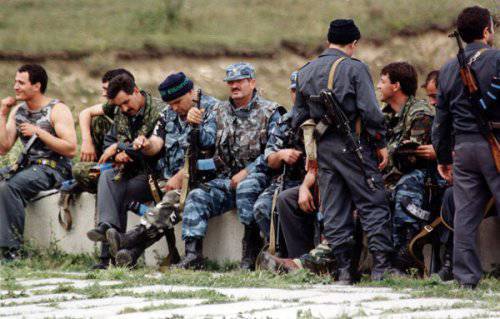
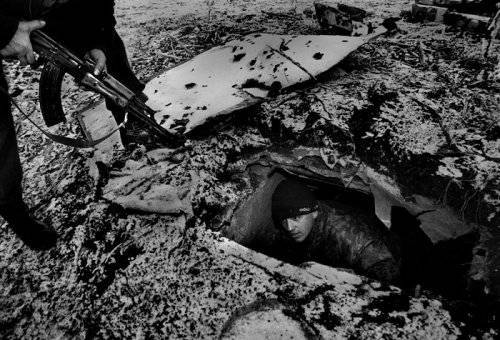
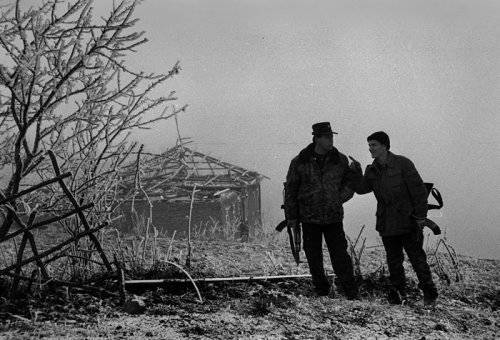
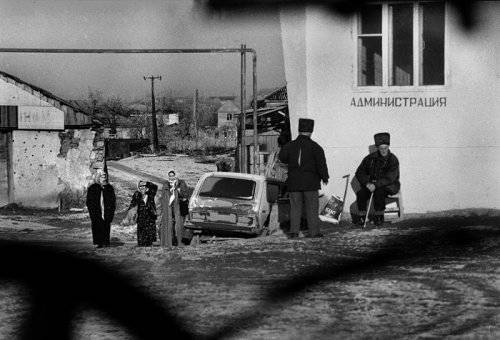
Information